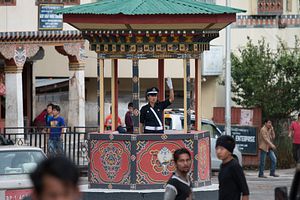Bhutan has slipped from its previous year’s ranking of 92 to 104th place in the 2015 World Press Freedom Index, published by Reporters Without Borders. But does that mean that freedom of information is on the decline in this new democracy?
Surprisingly, the county’s government-controlled newspaper, Kuensel, has suggested it is.
“We do not know if the government would take the ranking seriously, or if they would even care,” its editors wrote in an editorial, about Bhutan’s new ranking in the index, using an accusatory tone.
“Reporters may have access to mobile numbers (of government officials), but has the access to information improved? Again the answer is a resounding ‘no,’” they added, noting. “Journalists are still frowned upon as nosy people. Those with information are tight lipped or ordered not to talk to media. This is one order that is strictly followed, as it could be interpreted as disobedience.”
Interestingly, the newspaper based its opinion only on the ranking, overlooking more important indicators in the index.
Countries are ranked based on their respective scores in the areas of pluralism of opinions expressed, media independence, environment and censorship, legislative framework, transparency of institutions, quality of infrastructure and level of violence and harassment. It is possible for a country to fall in the rankings if other nations show improvement.
The scores range from 0 to 100, with 0 being the best possible score and 100 the worst, the index explains.
In fact, Bhutan’s overall score of 32.65 points in 2015 was only slightly higher than the previous year’s score of 32.46 points. And despite this minor decline in press freedom, a decline actually much smaller than the margin of error, Bhutan had the best score among the eight countries in the South Asia region.
Besides, Bhutan is the only country in South Asia whose “abuse score,” which measures the level of violence and harassment journalists face, was zero.
Moreover, Bhutan has come a long way in media freedom, given that it scored 90.75 points in 2002 when the country was an absolute monarchy with no private media. Its score improved to 25 points in 2006, when Bhutan’s Fourth King Jigme Singye Wangchuck allowed private media for the first time as part of the nation’s preparations for democracy. By 2008, when the nation had its first democratic election, the score had improved to 15.50 points.
Seven years later, though, Bhutan’s score has deteriorated from 15.50 to 32.65, mostly because private newspapers are closing down, and many senior journalists have left the profession.
Bhutan’s media cannot hope to earn enough advertising revenue from the country’s small private sector. And the market for media is also small, inevitable given that the country’s population is just 740,000. Therefore, most media depend almost entirely on government advertisements for survival.
While both the former DPT government and the incumbent PDP administration have claimed they want to foster a culture of democracy, they have failed to help private media houses survive.
In addition, a few months after coming to power, the PDP government replaced the managing directors of both Kuensel and the government-owned Bhutan Broadcasting Service, supposedly because they were perceived as pro-opposition DPT, which had appointed them.
When the DPT was in power, its government was accused of boycotting the investigative private newspaper, The Bhutanese, by trying to refuse advertisements to the publication after it published stories criticizing officials.
A study by the Journalists Association of Bhutan, an independent body, also found last year that 58 percent of working journalists think it’s “unsafe” to criticize officials, and 66 percent say that access to public information is “difficult.”
There’s no doubt that Bhutan’s government dislikes free media – it’s hardly alone in that. But in Bhutan, a small society that was ruled by popular and benevolent monarchs for about a century, this clash is being taken a bit too seriously. The government is uncomfortable being criticized by the media, and journalists seem unwilling to endure officials’ direct or indirect verbal admonishments.
However, the PDP government, led by Prime Minister Tshering Tobgay, has introduced a right to information bill in the National Assembly, as it had promised in its election manifesto. The National Council is currently considering the proposed legislation. Once it becomes a law, journalists will find it much easier to gather information from the government.
This sense of fear among the country’s journalists mainly arises from the perception that they are not allowed to report on certain things in a certain way, a perception that may have been created by those in authority. But apart from the government-controlled or -owned media, there are not many known anecdotes of members of the press being gagged.
As a foreign journalist, I haven’t faced any government reprisal. I recently made a video feature on Bhutan’s Christian minority, in which community leaders spoke openly about issues concerning their rights for the first time ever. There was no adverse reaction from the government against them or me.
I have done numerous other stories criticizing both the current and the previous governments, but I have never been denied entry into the country, and nor have officials refused to speak to me. I do hear about some officials being upset with me from time to time, but that doesn’t bother me a bit, and it shouldn’t.
After all, having a thick skin is part of being a journalist. And that’s something Bhutan’s journalists should understand.
































